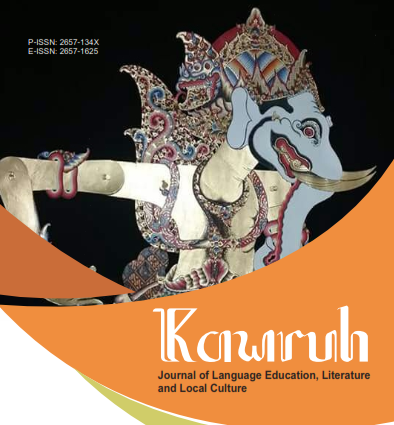Keterampilan Menyimak Teks Prosedur Melalui Teknologi Informasi “Tik-Tok”
DOI:
https://doi.org/10.32585/kawruh.v4i1.2246Kata Kunci:
Listening Skills, Technology, Tik - tokAbstrak
Listening skills for some teachers are more on listening skills, not on listening as a process and mechanics so that skills in technological sophistication are needed as interesting learning media. Technology can be used to help students develop listening skills through information technology, one of which is "Tik-Tok" with various available pages. Each type of technology provides opportunities for students to explore their listening strategies and in some cases develop new strategies. This study uses a descriptive method using a qualitative approach. In this case, the researcher is not directly involved in the object of study but only as an observer of the object of study contained in the contents of the "TikTok" account. The note-taking technique is carried out to record and select the elements that are listened to from social media or information technology "Tik-Tok" in Procedure Text learning then written into data paper. The purpose of the research is that with tiktok media students can observe, listen to technology, besides that listening is not only tangible in writing but with the digital era through tiktok video media students will understand in more detail listening with technology. Development of better listening skills and exploiting old technology or new technology in various ways in order to meet the needs of students in responding to changes and developments in listening learning technology. The conclusion is that listening with technology media provides new insights and new knowledge in listening skills, students are more enthusiastic to understand in depth than listening using technology, students can get to know better and become familiar with technology.Unduhan
Referensi
M. Abdul. (2019). “Kesiapan Kognitif Dalam Keterampilan Menyimak Peserta Didik Terhadap Proses Pembelajaran Bahasa Indonesia,” Pros. Senasbasa, vol. 3, no. 2, pp. 659–668, 2019.
Arono. (2013) “Pengembangan Pembelajaran Keterampilan Menyimak Melalui Teknologi Informasi,” J. Pendidik. Bhs. dan Sastra, vol. 13, no. 2, p. 129, 2013, doi: 10.17509/bs_jpbsp.v13i2.286.
A. P. Kirana. (2021). “Abreviasi pada Kolom Komentar Akun Tribunnews di TikTok,” no. 5, pp. 19–27, 2021.
W. N. Aji. (2018). “Aplikasi Tiktok Sebagai Media Pembelajaran Bahasa dan Sastra Indonesia,” Pros. Semin. Nas. Pertem. Ilm. Bhs. dan Sastra Indones., vol. 431, pp. 431–440, 2018.
R. W. Yanuarista. (2021). “Implementasi Teks Prosedur pada Video Tutorial Memasak dalam Media Sosial Tik Tok,” Bapala, vol. 8, no. 04, pp. 99–111, 2021.
K. A. Chumairoh and L. N. Hasan. (2021). “Pengembangan Media Pembelajaran Video Animasi Dongeng Untuk Pembelajaran Menyimak Cerita Di Kelas III Sdn Sukabumi VI Probolinggo,” 2021.
R. Agustini and M. Sucihati. (2020). “Penguatan Pendidikan Karakter melalui Literasi Digital sebagai Strategi menuju Era Society 5.0,” Pros. Semin. Nas. Pendidik. Progr. Pascasarj. Univ. PGRI palembang, pp. 999–1015, 2020.
J. Alvarez-Cedillo, M. Aguilar-Fernandez, R. Sandoval-Gomez, and T. Alvarez-Sanchez. (2019). “Actions to be taken in mexico towards education 4.0 and society 5.0,” Int. J. Eval. Res. Educ., vol. 8, no. 4, pp. 693–698, Dec. 2019, doi: 10.11591/IJERE.V8I4.20278.
P. Puji. (2021). “Reinforcement of Islamic education in the revolution era of society 5.0,” AMCA J. Relig. Soc., vol. 1, no. 1, pp. 4–7, Feb. 2021, doi: 10.51773/AJRS.V1I1.32.
D. Daryono and M. B. Firmansyah. (2021). “Public Relations Promotion Strategy for Higher Education in the Era of Society 5.0,” Praniti Wiranegara (Journal Res. Innov. Dev. High. Educ., vol. 1, no. 1, pp. 10–25, May 2021, doi: 10.53602/PWJRIDHE.V1I1.16.
N. Maghfiroh and M. Sholeh. (2022). “Implementasi Kurikulum Merdeka Belajar Kampus Merdeka Dalam Menghadapi Era Disrupsi Dan Era Society 5.0,” J. Inspirasi Manaj. Pendidik., vol. 09, no. 05, pp. 1185–1196, 2022.
E. I. Massitoh. (2021). “Analisis Faktor Yang Mempengaruhi Rendahnya Keterampilan Menyimak,” Pros. Semin. Nas. Pendidik. , vol. 3, pp. 330–333, 2021, [Online]. Available: http://prosiding.unma.ac.id/index.php/semnasfkip/article/view/614:2021
Arifudin. (2021).“Pengembangan Media Video Pembelajaran Teks Prosedur Kompleks Untuk Siswa Kelas XI SMA,” pp. 2013–2015, 2021.
W. Nugroho Aji and D. Bambang Putut Setiyadi. (2020). “Aplikasi Tik Tok sebagai Media Pembelajaran Ketrampilan Bersastra,” J. Metaf., vol. 6, no. 2, pp. 57–66, 2020, [Online]. Available: https://jurnal.yudharta.ac.id/v2/index.php/muallim/article/download/2201/1610: 2020
F. U. Farinda and S. N. Camil. (2021). “Implementasi pendidikan karakter dalam pembelajaran bahasa dan sastra Indonesia serta tantangan di era revolusi society 5.0,” in Prosiding Samasta, 2021, pp. 297–305.
F. Nastiti and A. Abdu. (2020). “Kesiapan pendidikan Indonesia menghadapi era society 5.0,” J. Kaji. Teknol. Pendidik., vol. 5, no. 1, pp. 61–66, 2020, doi: 10.17977/um039v5i12020p061.
S. Surahman. (2022). “Implementasi Manajemen Mutu Pendidikan Islam Menuju Era Society 5.0,” J. Teach. Educ., vol. 3, no. 2, pp. 170–182, 2022.
R. Rasdin, Y. Mulyati, K. Kurniawan, and U. P. Indonesia. (2021). “Fenomena Tik Tok sebagai Media Komunikasi Edukasi,” Pros. Riksa Bhs., vol. 3, pp. 227–235, 2021.
Meylin, Indihadi. (2021). Hasil Tulisan Teks Prosedur Peserta Didik Kelas IV Sekolah Dasar. Pedadikta: Pendidikan Guru Sekolah Dasar. Vol. 8, No 3, 742-751, 2021.
Unduhan
Diterbitkan
Cara Mengutip
Terbitan
Bagian
Lisensi
Authors who publish with the Kawruh: Journal of Language Education, Literature and Local Culture agree to the following terms:
- Authors retain copyright and grant the journal the right of first publication with the work simultaneously licensed under a Creative Commons Attribution License (CC BY-SA 4.0) that allows others to share the work with an acknowledgment of the work's authorship and initial publication in this journal.
- Authors are able to enter into separate, additional contractual arrangements for the non-exclusive distribution of the journal's published version of the work (e.g., post it to an institutional repository or publish it in a book), with an acknowledgment of its initial publication in this journal.
- Authors are permitted and encouraged to post their work online (e.g., in institutional repositories or on their website) prior to and during the submission process, as it can lead to productive exchanges, as well as earlier and greater citation of published work.

